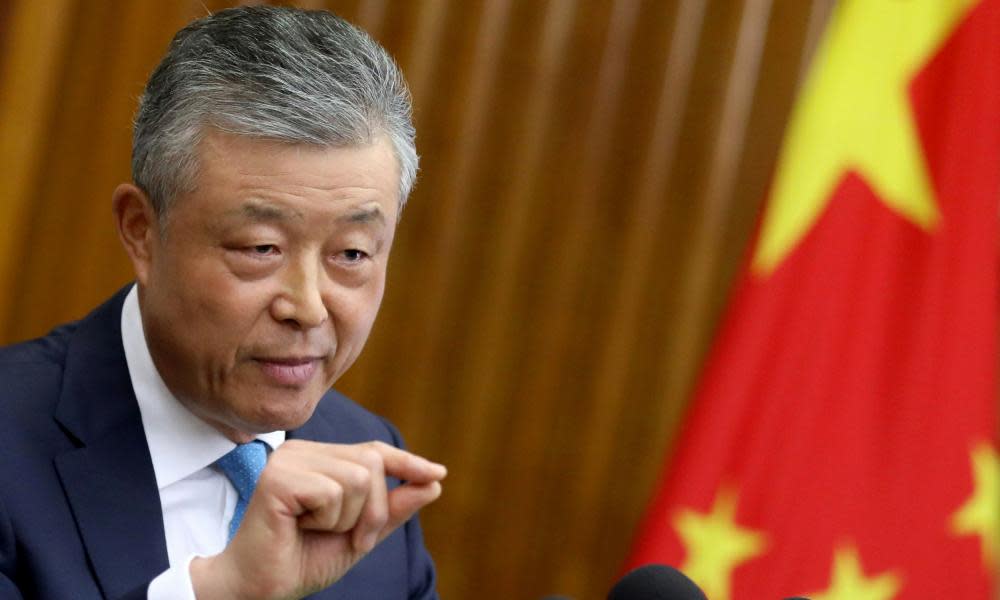Hong Kong: China says it will not recognise UK overseas passports

China will not recognise the British national (overseas) passport as a legal travel document, raising the prospect that the 3 million Hong Kong citizens eligible for the passport will be banned from leaving Hong Kong by the Chinese government.
The warning was made at a press conference by the Chinese ambassador to the UK, Liu Xiaoming, in which he also warned it was hard to imagine a global Britain that bypassed or excluded China. Decoupling from China would mean decoupling from growth and the future, he suggested.
UK-China relations have headed into a deep freeze after the UK banned the China state-backed Huawei from UK 5G technology and then protested over the introduction of new security laws in Hong Kong, a former British colony.
Related: UK reveals details of special Hong Kong visa for overseas nationals
Xiaoming punctuated his online press conference with videos seeking to debunk reports that Uighur Muslims have been suppressed in Xinjiang province, saying those sent to re-education centres, which he claimed were akin to boarding schools, were only going through the same kind of anti-radicalisation training as terrorists in the west.
He said it was the UK, and not China, that had changed and should take full responsibility for the current difficulties in the relationship. He blamed cold-war warriors in the Conservative party, and said they were influenced by outside powers. The UK and China should have the wisdom not to allow Anglo-China forces and cold-war warriors to kidnap the relationship, he said. Great Britain, he argued, “cannot be great if it does not have independent foreign policies”.
The ambassador was reluctant to be drawn on the practical implications of refusing to recognise the BNO passport as a valid travel document but said the move was a response to the UK’s decision to offer a right for all those eligible for a BNO passport to seek a path to citizenship in the UK.
He said the offer breached the 1984 Memorandum of Agreement that promised the UK would not provide a permanent right of abode to BNO passport-holders. “Since the UK have violated their commitment, we have to let them know that we have to take measures not to recognise the BNO passport as a valid travel document,” he said.
The refusal to recognise the BNO passport in theory raises the prospect of tens of thousands of Hong Kong citizens being trapped in the city or being refused re-entry if they leave the country andtry to return.
He also urged British politicians not to follow up the Huawei decision by forcing China out of the French-led nuclear project Hinkley Point C, saying the project would allow the UK to meet its commitment to reach zero-carbon emissions by 2050.
His press conference came alongside an article in the South China Morning Post that he said no British newspaper would publish, threatening to withdraw Huawei and several billions in investment following the government’s decision to ban the manufacturer’s products from 5G mobile networks.
He wrote: “In 2018, the company announced a further investment plan of £3bn in the next five years, which is a positive vote for growth in Britain. Unfortunately, this will now be subject to uncertainties in light of the British government’s recent decision.”
He also suggested the UK decision meant the UK may miss out on the “development bonus” of China, the world’s fastest-growing economy.
Xiaoming, the ambassador in the UK for a decade, also defended the disqualification of 12 pro-democracy candidates from this autumn’s legislative elections in Hong Kong, saying the new security laws had nothing to do with free speech and targeted a few criminals.
He repeatedly said China had no desire to export its model, promising: “We do not want to threaten, challenge or replace anyone”. He insisted: “China threatens no one. We just let you know the consequences. China wants to be a friend of the UK and a UK partner, but if you do not want to be a partner and our friend, and you want to treat China as a hostile power, you will pay the price.
“We have a thousand reasons to make this relationship successful and not one reason to make it fail.”

 Yahoo News
Yahoo News 
